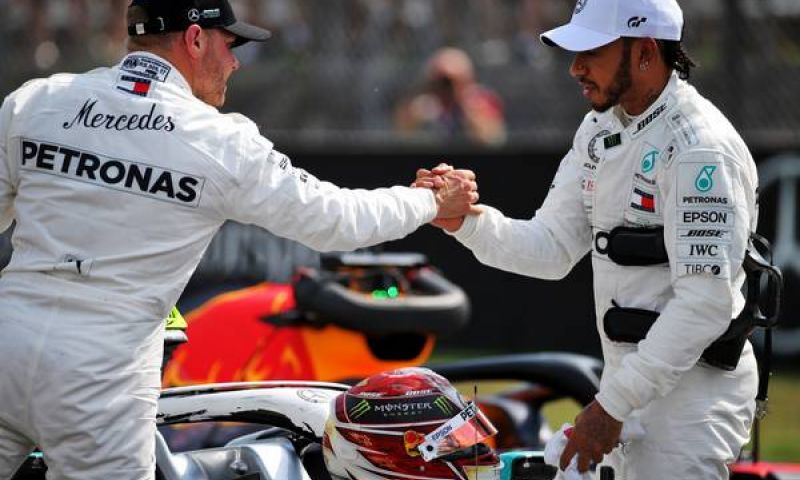F1 News

How Mercedes wrote history with their 6th consecutive championship
- Nicolás Quarles van Ufford
By sealing both the constructors' and the drivers' championship on Sunday at Suzuka, Mercedes AMG F1 have become the first-ever team to win six double championships consecutively.
Ferrari did win six constructors' titles on the spin between 1999 and 2004, but any McLaren fan will remind you Mika Hakkinen was the one who walked away with the drivers' championship that year.
Although no winner has been decided yet in the drivers' championship, Charles Leclerc, Sebastian Vettel and Max Verstappen are all ruled out of contention now with four races to go, meaning either Lewis Hamilton or Valtteri Bottas will win the drivers' title.
2019 F1 drivers' standings (17/21)
| Position | Driver | Team | Points |
| 1. | Lewis Hamilton | Mercedes | 338 |
| 2. | Valtteri Bottas | Mercedes | 274 |
| 3. | Charles Leclerc | Ferrari | 223 |
| 4. | Max Verstappen | Red Bull Racing | 212 |
| 5. | Sebastian Vettel | Ferrari | 212 |
With a difference of 64 points and four races to go, Hamilton will most likely win his sixth title as well. Still, how did we reach the point where Mercedes have been able to seal both titles with four races to spare?
Leclerc's drama in Bahrain
After getting his maiden pole position, Leclerc was having a fantastic race in Bahrain as he was comfortably on his way to convert that pole into his maiden F1 win. Then, drama struck as his engine started to malfunction. Despite not being nearly as quick all weekend long, Hamilton easily overtook the limping Leclerc and Mercedes took the first of their five one-twos of the season.
It must have been a hammer blow for Ferrari, being so close to a win and then seeing your rivals getting a one-two. In pre-season, the SF90 looked the quickest car by far, and after a very disappointing result in Australia where they missed out on the podium, they only got third in Bahrain.
Bottas 2.0 wasn't ready to be number two
It seems like ages ago now but Bottas really did push Hamilton to the limit at the start of the season, winning two of the opening four races in Australia and in Bahrain. He led the championship at that point and awoke the beast inside Hamilton, something that would send the Brit on an absolute hot-streak later in the season.
What we also saw was a fire in Bottas to not be beaten by Hamilton, a desire to prove himself after having a very poor end to a poor year in 2018. The two teammates pushed each other to the limit and made each other better, as all good teammates do.
Leclerc's mistakes, Vettel's form
Often, Mercedes didn't even have to do much as Ferrari shot themselves in the foot quite often. Think back to Monaco, where Leclerc didn't make it out of Q1 after a tactical blunder from Ferrari, who simply forgot to have him go out for his second run. At his home Grand Prix as well.
Then, on Sunday, Leclerc starting overtaking people left and right despite the lack of room in the streets of the principality. Eventually, it went wrong as he clashed with Nico Hülkenberg at Rascasse and he got a puncture. His lack of experience showed then, as he was driving way too fast with a punctured tyre on his way to the pitlane, completely destroying the floor of his car. Vettel did manage to get second. It was the first race that didn't finish in a Mercedes one-two.
Despite Vettel getting second in Monaco, the race after is where things really went downhill for the four-time champion. In Canada, we had the famous incident of the German making a mistake under pressure from Hamilton for the lead and dangerously rejoining the track, giving him a five-second penalty that cost him and Ferrari their first win of the season.
After that, he spiralled down. Getting out-qualified every Saturday while also not looking his own self, Vettel was in terrible form as Mercedes, and mainly Hamilton, were collecting wins and podiums for fun. There was a little period where Verstappen was in red-hot form, but Hamilton was always near the Dutchman.
Too little, too late for Ferrari
The lack of consistency once again was the killer blow for Ferrari after the summer, when they did get the ball rolling. Leclerc was starting to pick up wins, winning three on the bounce including a massive home victory at Monza, but Vettel wasn't close enough, meaning Mercedes often took more points away from the weekend, all in all, even if Leclerc was winning.
Ferrari did get their first one-two in two years in Singapore, albeit controversially as Vettel undercut Leclerc. In Russia, they looked on for another one-two until Vettel's SF90 gave up with an MGU-K issue. These consistency issues, whether it's the driver or the car, simply don't happen at Mercedes.
If they don't win or if they're not the quickest car on a weekend, you can bet your bottom dollar they will still maximise their performance during the race. No funny business. This really can't be said for Ferrari, who had their two drivers arguing back and forth during the Russian Grand Prix, underlining their lack of chemistry and lack of team spirit.